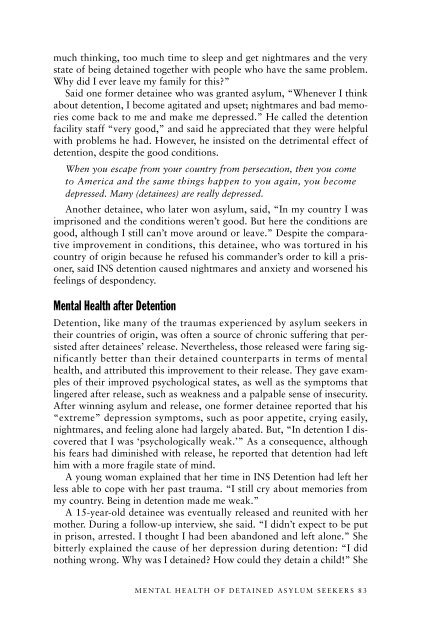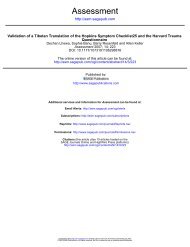From Persecution to Prison - Bellevue/NYU Program for Survivors of ...
From Persecution to Prison - Bellevue/NYU Program for Survivors of ...
From Persecution to Prison - Bellevue/NYU Program for Survivors of ...
Create successful ePaper yourself
Turn your PDF publications into a flip-book with our unique Google optimized e-Paper software.
much thinking, <strong>to</strong>o much time <strong>to</strong> sleep and get nightmares and the verystate <strong>of</strong> being detained <strong>to</strong>gether with people who have the same problem.Why did I ever leave my family <strong>for</strong> this?”Said one <strong>for</strong>mer detainee who was granted asylum, “Whenever I thinkabout detention, I become agitated and upset; nightmares and bad memoriescome back <strong>to</strong> me and make me depressed.” He called the detentionfacility staff “very good,” and said he appreciated that they were helpfulwith problems he had. However, he insisted on the detrimental effect <strong>of</strong>detention, despite the good conditions.When you escape from your country from persecution, then you come<strong>to</strong> America and the same things happen <strong>to</strong> you again, you becomedepressed. Many (detainees) are really depressed.Another detainee, who later won asylum, said, “In my country I wasimprisoned and the conditions weren’t good. But here the conditions aregood, although I still can’t move around or leave.” Despite the comparativeimprovement in conditions, this detainee, who was <strong>to</strong>rtured in hiscountry <strong>of</strong> origin because he refused his commander’s order <strong>to</strong> kill a prisoner,said INS detention caused nightmares and anxiety and worsened hisfeelings <strong>of</strong> despondency.Mental Health after DetentionDetention, like many <strong>of</strong> the traumas experienced by asylum seekers intheir countries <strong>of</strong> origin, was <strong>of</strong>ten a source <strong>of</strong> chronic suffering that persistedafter detainees’ release. Nevertheless, those released were faring significantlybetter than their detained counterparts in terms <strong>of</strong> mentalhealth, and attributed this improvement <strong>to</strong> their release. They gave examples<strong>of</strong> their improved psychological states, as well as the symp<strong>to</strong>ms thatlingered after release, such as weakness and a palpable sense <strong>of</strong> insecurity.After winning asylum and release, one <strong>for</strong>mer detainee reported that his“extreme” depression symp<strong>to</strong>ms, such as poor appetite, crying easily,nightmares, and feeling alone had largely abated. But, “In detention I discoveredthat I was ‘psychologically weak.’” As a consequence, althoughhis fears had diminished with release, he reported that detention had lefthim with a more fragile state <strong>of</strong> mind.A young woman explained that her time in INS Detention had left herless able <strong>to</strong> cope with her past trauma. “I still cry about memories frommy country. Being in detention made me weak.”A 15-year-old detainee was eventually released and reunited with hermother. During a follow-up interview, she said. “I didn’t expect <strong>to</strong> be putin prison, arrested. I thought I had been abandoned and left alone.” Shebitterly explained the cause <strong>of</strong> her depression during detention: “I didnothing wrong. Why was I detained? How could they detain a child!” SheMENTAL HEALTH OF DETAINED ASYLUM SEEKERS 83



